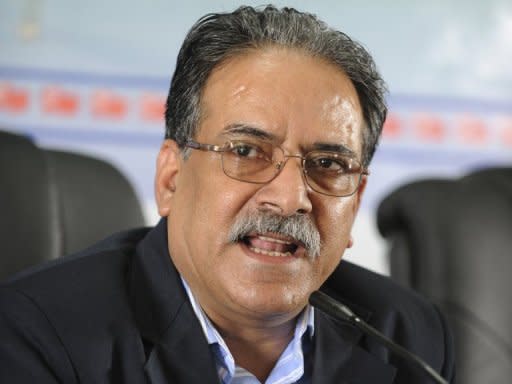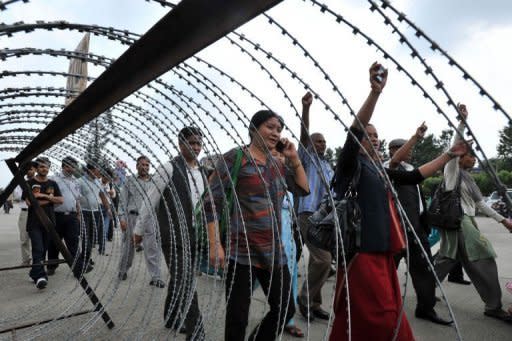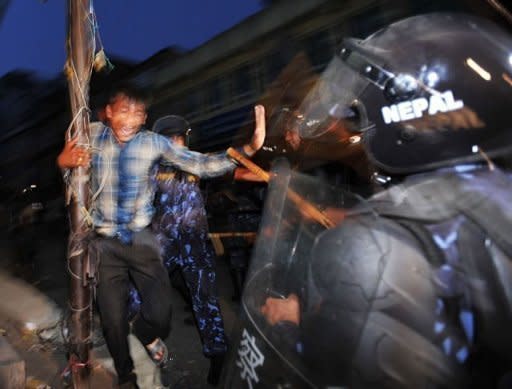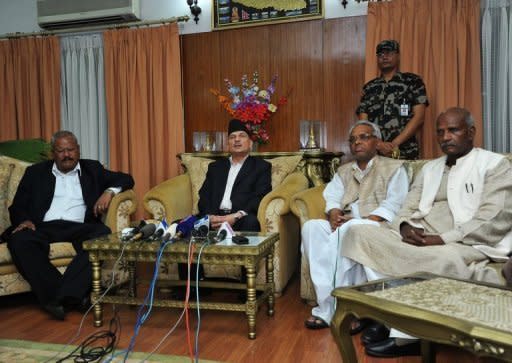Maoist leader calls for unity in crisis-hit Nepal
The leader of Nepal's Maoists called Monday for rival parties to join a national unity government to take the country to fresh elections and said he was open to a change of prime minister. The concession came with analysts warning of a dangerous six-month power vacuum after the nation's parliament failed to agree a new post-war constitution Sunday and was dissolved to make way for the polls. "At this difficult juncture, political agreement is paramount," Maoist party chairman Pushpa Kamal Dahal said in a televised speech. "So, we urge all the parties to forge a consensus. We should move towards a national unity government. "At the moment, there's no question of the prime minister's resignation. But the leadership of a national unity government is open for discussion." Premier Baburam Bhattarai announced late Sunday that the country's parliament, elected in 2008 to write the constitution after a decade of civil war, would be disbanded ahead of November elections. Lawmakers had failed again to break years of deadlock on the nation's new federal structure which is meant to bring lasting stability to the impoverished Himalayan country and unite its more than 100 ethnic minorities. The widespread hope in Nepal that followed the end of the civil war and the abolition of the unpopular monarchy has been replaced by a growing sense of anger which analysts warned could lead to violence. Political instability has stifled economic growth, forcing many people to seek work overseas, and thousands of Nepalese have taken to the streets in recent weeks to protest at the lack of progress in their country. The constitution was intended to create a new secular, democratic republic following the abolition of Nepal's centuries-old Hindu monarchy after Maoist rebels gave up arms and won the 2008 elections. An estimated 16,000 people died in the 1996-2006 civil war. The move to dissolve parliament leaves the nation with a deeply divided caretaker government which has no mandate and no chamber in place to pass laws. New members of the government resigned in protest on Monday and Bhattarai, a senior Maoist leader who formed a national unity coalition two weeks ago, faced a storm of criticism from political opponents, analysts and the media. "After the Constituent Assembly failed to deliver the constitution, the prime minister should have resigned," constitutional law expert Bipin Adhikari told AFP. "But even before that, he should have had an exit plan ready before the expiry of the term," he added. "All he did is let the deadline for the Constituent Assembly pass and (the Constituent Assembly) dissolve." Members of the cabinet from the Unified Marxist Leninist (UML) on Monday followed Nepali Congress ministers in resigning amid growing calls among both parties for the prime minister to resign. Nepal's leading newspapers carried excoriating editorials blaming the main party leaders for the crisis, with the Republica daily describing the breakdown in talks as "the biggest blow to the cause of democracy". Political analyst Tilak Pathak told AFP the "human cost of an election is likely to be very high. Even if the election takes place, it will be very violent." The deadlock over the constitution pitted the Maoists, who dominate the assembly, against other parties. The Maoists want the creation of up to 14 states named after ethnic groups, while their rivals say dividing Nepal along ethnic lines will fuel unrest. Despite four extensions of the assembly's mandate, it was unable to complete the far-reaching document, and the Supreme Court ruled that any further extensions would be illegal. "Tensions are running high after the failure of the political parties to agree on a constitution," said Human Rights Watch South Asia director Meenakshi Ganguly. "However, all parties concerned should refrain from violent protests that cause civilian harm while security forces should respond with proportionate force."






